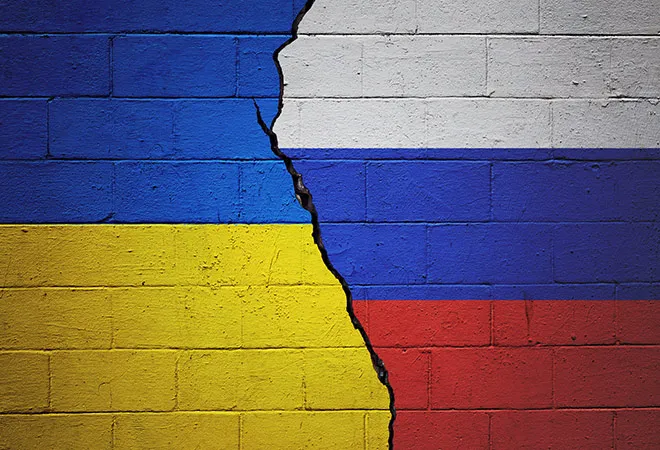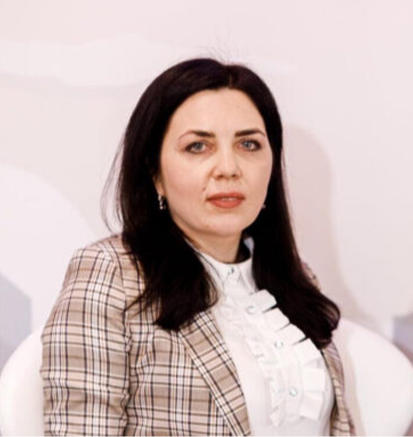-
CENTRES
Progammes & Centres
Location
Russia, in its quest to expand its sphere of influence, will continue to put the West and Ukraine to the test

Russia has deployed about 130,000 troops on the border with Ukraine and is threatening a full-scale military invasion to achieve its perceived security interests in Europe. Moscow is urging the United States (US) and North Atlantic Treaty Organisation (NATO) to give written assurances that NATO will roll back its expansion to 1997 levels and will not deploy offensive weapons near Russia's borders.
These demands are an attempt by the Russian authorities to divide Europe into spheres of influence, as it was during the Cold War. Also, in effect, Russia is contesting the accession of 14 countries to the bloc, most of them belonged to the Warsaw Pact.
Russia’s President Vladimir Putin has repeatedly stressed that the collapse of the Soviet Union was the greatest tragedy of the twentieth century, and does not hide his desire to regain influence over the former Soviet republics.
Seeking security guarantees from the West and Ukraine, Russia is violating the 2008 Budapest Memorandum Security Guarantees, which opened the door for Ukraine’s NATO membership.
Last year, Russia effectively ensured this in Belarus, and this year, the Russia-led Collective Security Treaty Organisation (CSTO) intervened in Kazakhstan at the behest of the government to stabilise the situation and thus increase the Russian influence on the political processes of Kazakhstan.
Moscow wants Ukraine to abandon its course towards NATO and the European Union because Ukraine is an important link in the Kremlin's geopolitical ambitions. Seeking security guarantees from the West and Ukraine, Russia is violating the 2008 Budapest Memorandum Security Guarantees, which opened the door for Ukraine’s NATO membership.
In 2014, Russia occupied Crimea and parts of Donetsk and Luhansk regions of Ukraine. Since then, Russia used all forms of pressure—economic, energy, misinformation, cyber attacks, subversive activities, proxy war—to pressure Ukraine to abandon its course for membership in NATO and the EU. But so far it has failed; according to a poll held in December 2021, 59.2 percent of Ukrainians support joining NATO and 67.1 percent joining the EU.
At the global level, after the disastrous withdrawal of troops from Afghanistan, the position of the US faltered. Russia and China have repeatedly stressed the apparent inability of the US to support its allies and the loss of leadership at the international level. The two countries are challenging the international order supported by world democracies led by the US and trying to force their own vision of the world order.
Russia and China have repeatedly stressed the apparent inability of the US to support its allies and the loss of leadership at the international level.
It has been a goal for many years for the Russia to return to the negotiating table and discuss a new division of the world with the US. Therefore, the outcome of the current confrontation will be important, and the US should demonstrate its ability to respond firmly to the challenges of autocratic regimes. Weakness in the confrontation will not only affect the balance of power on the European continent but will also play an important role for other countries such as China, Iran, and the North Korea. It will also signal President Biden's inability to restore the US leadership to both the domestic audience and the world in general.
Currently, the main challenge in Europe for the Biden administration is to enlist the support of the transatlantic allies to protect Ukraine. The lack of unity of the European partners hinders the development of the common severe response in case of the attack by ths Russian army. The behaviour of Germany, the most influential force in the European community, is considered to be the most significant. The US was under pressure from Germany and France to prevent Ukraine and Georgia to be a part of the NATO Membership Action Plan in 2008, and since 2014, Berlin has been strongly opposed to providing arms assistance to Ukraine in its confrontation with Russia. Even in the current situation, Berlin has banned its allies from providing weapons with German components to Ukraine.
The lack of unity of the European partners hinders the development of the common severe response in case of the attack by ths Russian army.
At the same time, Russia's behaviour has provoked a backlash from Eastern Europe, the Baltics, Britain, and the US, which are providing unprecedented military assistance to Ukraine and promising severe sanctions against Russia in the event of a military conflict.
The US and NATO have already stressed that they will not abandon the principle of open doors for new members, and no country has the right to dictate terms to another. However, Russia is trying to find a weak point to influence Ukraine.
Kyiv emphasises the implementation of the security aspect of the Minsk Agreements, which call for cessation of hostilities, disarmament and withdrawal of illegal Russian formations, as well as the return of Ukrainian control over the border with Russia. However, Moscow stresses the conditions which require Ukraine to give a special status to the occupied territories without regaining full control over the territories till an internationally supervised referendum. Ukraine now sees this as means to implement the political aspects of the Agreements without fulfilling the security conditions. Russia seeks to consolidate the so-called “grant a veto” in the region, which will block Kyiv's strategic decisions, including in the implementation of the European choice.
Currently, the Russian politicians are raising the stakes by announcing their intention to recognise the independence of these territories in mid-February at a meeting of the State Duma.
Since 2014, Russia has carried out deep integration of the occupied territories, including providing Russian passports to 720,000 residents of Donetsk and Luhansk regions, putting the Russian ruble into circulation, unifying the economic system, and introducing Russian as the only official language. Currently, the Russian politicians are raising the stakes by announcing their intention to recognise the independence of these territories in mid-February at a meeting of the State Duma. This could provoke criticism against the government in Ukraine for its inability to reclaim the occupied territories.
Russia's military threat has already put heavy pressure on the Ukrainian economy. According to President Zelensky, the panic caused by the possibility of the war has already led to the withdrawal of US $12.6 billion from Ukraine. Russia's goal is to create political and social discontent, which can destabilise the country and lead to regime change in Ukraine.
For Russia, a full-scale war carries many risks with huge possible financial and human losses, so it is unlikely to embark on that path. Support from the US and European partners increases the cost of Russian aggression against Ukraine. In addition, during eight years of the war, the Ukrainian army has been hardened in battles with Russian troops.
The purpose of the current military blackmail is to check the West's collective red lines vis-á-vis Russia. If the US-led West fails this test, Russia will continue its destructive actions not only in Ukraine but will seek to spread its influence across Europe.
The views expressed above belong to the author(s). ORF research and analyses now available on Telegram! Click here to access our curated content — blogs, longforms and interviews.

Nataliya Butyrska is a freelance expert on International Relations from Kyiv, Ukraine. ...
Read More +